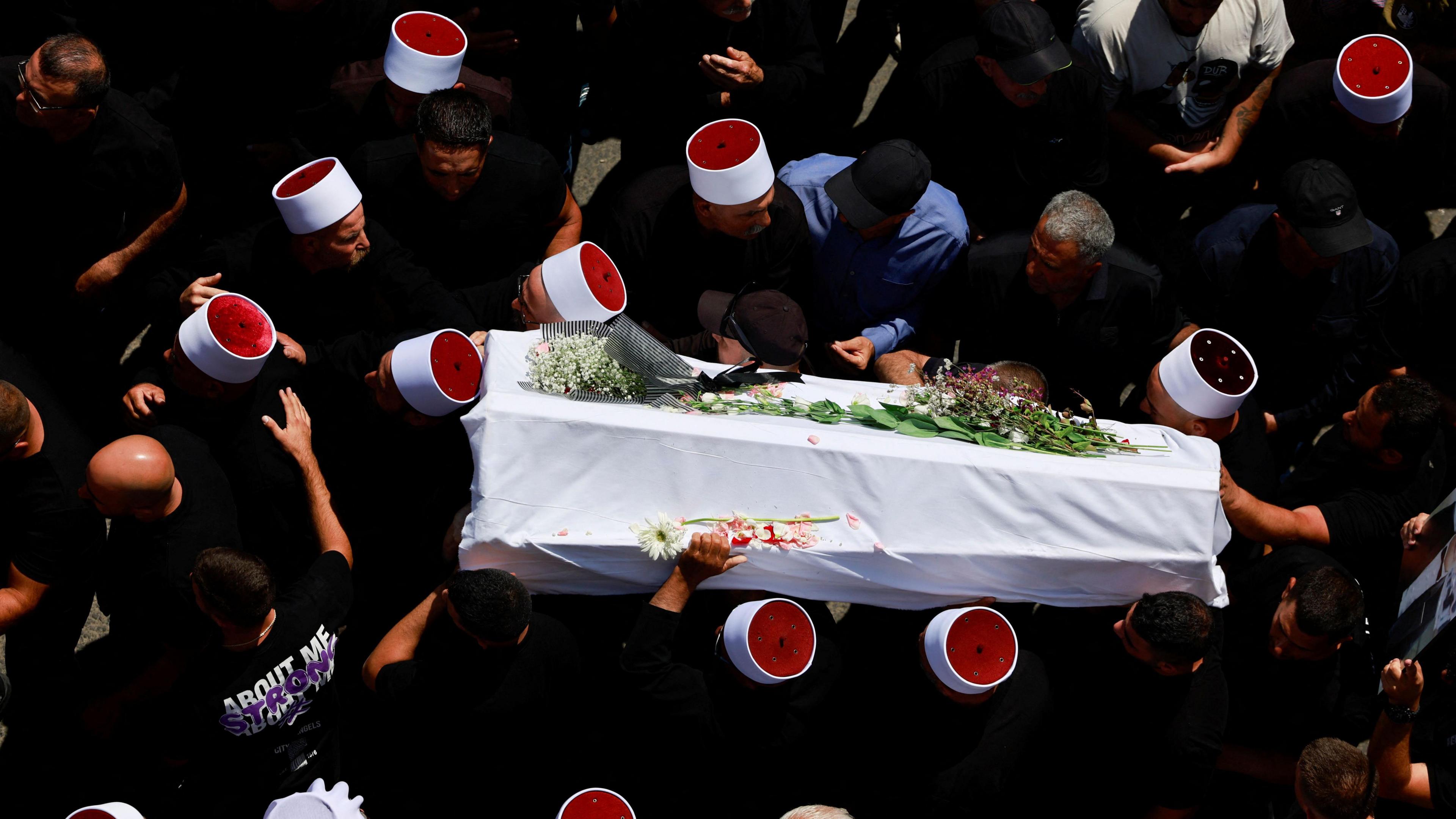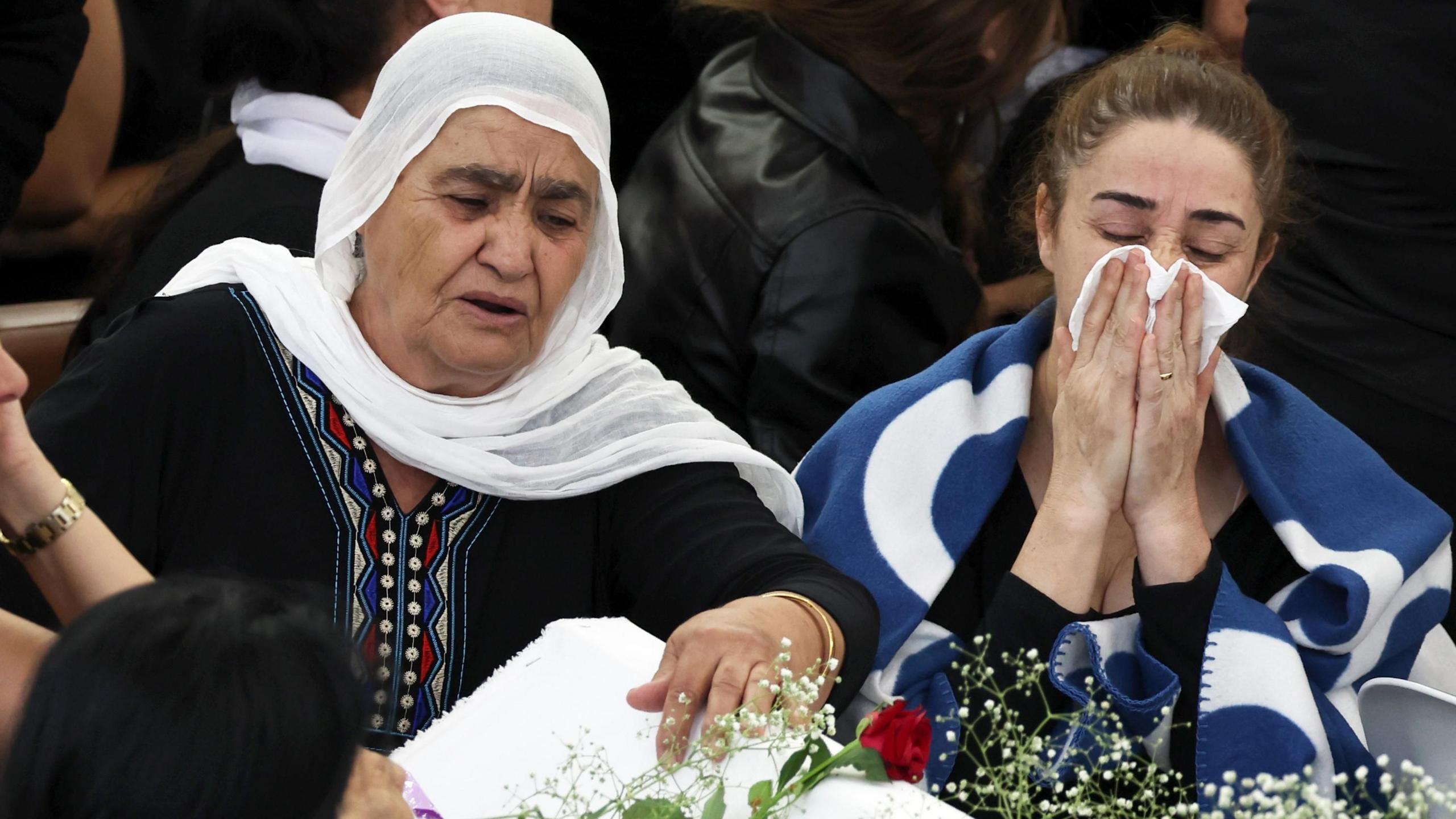Rocket strike puts Israel and Hezbollah on brink of all-out war

Several children were killed in the strike in the Israeli-occupied Golan Heights
- Published
At the University of Haifa, less than 50km (30 miles) from Israel’s border with Lebanon, they’re taking no chances.
The morning after a rocket fell on a football field in the Israeli-occupied Golan Heights, killing 12 children and teenagers, the university authorities announced that all staff based above the fifth floor in the 30-storey building should work from home. The fear is growing that they’re in the line of fire from the Lebanese militant group Hezbollah.
“In the last war with Hezbollah in 2006, their weapons reached Haifa”, Esther Parpara, a member of staff from the university told me. “This is a dangerous moment. Parents are helping police and guards to patrol kindergartens. I’m avoiding crowded places. We don’t seek war – but Hezbollah want to destroy Israel and the Jewish people, so can we just let them do that without defending ourselves?”
Cross-border fire between Israel and Lebanon has grown steadily since 8 October, when Hezbollah fired rockets and shells at Israeli sites in solidarity with the Hamas attack on Israel a day earlier. Both groups call for the destruction of the Israeli state.
Frequent attacks by Hezbollah have struck northern Israel and the Golan Heights, which Israel seized from Syria during the 1967 war and annexed in 1981. Israel has launched air strikes and missiles into southern Lebanon and beyond, including an overnight wave of attacks apparently in response to the rocket fire on Saturday.
The tit-for-tat strikes since October have killed more than 450 people in Lebanon – around 100 of them civilians – Lebanon's health ministry says, while Israel says 23 civilians and 17 soldiers have been killed. The skirmishes had been relatively contained, suggesting both sides were aiming to avoid a head-on confrontation.
But now the question is how far Israel will go in response to Saturday’s tragedy, the biggest single loss of life in the cross-border attacks since October.
Thousands lined the streets of the town to mourn the young victims, holding flowers and photos as they crowded beside the small white coffins. Hezbollah says it did not fire the deadly rocket, but the Israeli government insists that’s a lie. Following the strike, the Lebanese militants are said to have pre-emptively cleared out some key sites in the south of the country and the eastern Bekaa valley in the anticipation of a large-scale Israeli attack.
Israel’s prime minister returned early from the US to chair a security cabinet meeting, amid calls to hit back hard. Benjamin Netanyahu has promised that Hezbollah will “pay a heavy price which it has not paid up to now”.
Israel Katz, the foreign minister, said Hezbollah’s leader, Hassan Nasrallah, should “pay with his head”, while the far-right finance minister, Bezalel Smotrich, warned Israel was approaching all-out war with Hezbollah.

The strike was the deadliest cross-border attack since fighting escalated in October
Perilous moment
But Israel knows that the price of such a war with the Lebanese militant group could be devastating – for both sides.
Hezbollah is the strongest non-state actor in the region, with an estimated 150,000 rockets and missiles in its arsenal. It is Iran’s most important proxy in the Middle East – and an attack by Israel could draw in Tehran, which warned Israel that any “new adventures” in Lebanon could lead to “unforeseen consequences”.
And Israeli troops are still stretched in Gaza. Opening up another military front as their munitions run low could simply be unfeasible.
On the other hand, some 60,000 Israelis have been displaced from the border region with Lebanon over the past few months – and many are demanding that their government neutralise the threat from Hezbollah.
And Mr Netanyahu, whose popularity at home is plummeting, is doing all he can for his political survival. Critics claim he is prolonging the war in Gaza by adding ever more stringent demands on Hamas for a ceasefire deal, knowing that once the fighting stops there, he could face an early election and the end of his career.
The fear is that weakened and under pressure from far-right bellicose ministers, he may now be tempted to expand the fight into Lebanon in part for domestic political aims.
This is a perilous moment. And while the international calls for restraint from both sides grow louder, this tinderbox region waits to see if the Golan Heights rocket will spark an inferno.
Update 8 August: This report has been amended to attribute Lebanese casualty figures to the country's health ministry